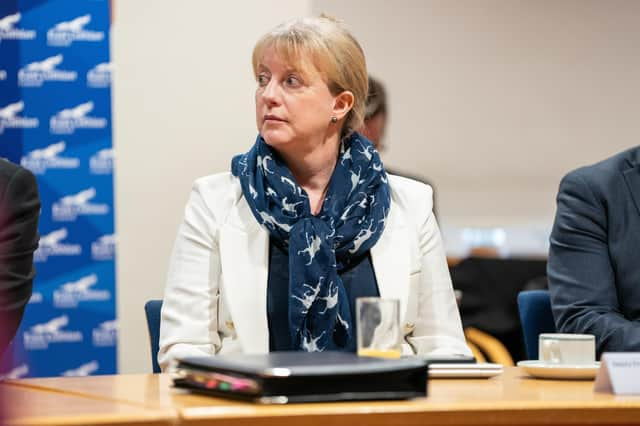Euan McColm: Virtue signalling more important to politicians than effectiveness


These days, a troubling number of politicians care more about being seen to be kind than being seen to be effective. We live in an era dominated by virtue-signallers with endless energy for explaining their devotion to this marginalised group or that righteous cause and vanishingly little enthusiasm for legislating effectively.
Too many elected members, their narcissism wildly out of control, prioritise their public images over all else.
Advertisement
Hide AdAdvertisement
Hide AdTake, as a thwocking great example, the sight last year of MSPs from across Holyrood’s parties congratulating themselves on passing a bill to reform the Gender Recognition Act to allow trans people to self-ID. Member after member rose to describe – often looking up for approval from the activists who packed the public benches – how they had played their part in a “historic” piece of lawmaking.
It was – depending on your stomach for endless self-congratulation – either deep inspiring or utterly nauseating.
Even as those MSPs spoke, it was abundantly clear that the legislation they’d passed unworkable. The consultation process was a shambles, with the views of government-funded pressure groups given greater weight than the warnings of feminists who suggested the legislation would impact on women’s single-sex spaces or the words of lawyers who told MSPs their reform of the GRA would never make it to statute because it would impact on the UK-wide Equality Act.
Those who spoke up against the Scottish government’s flawed bill weren’t merely ignored. They were vilified. To oppose reform of the Gender Recognition Act was to be a bigot. Critics did not have valid philosophical or legal points, they were driven by hatred.
The language around the discussion grew increasingly hysterical, with some of those supportive of the law accusing opponents of wishing to erase trans people. Shamefully, there are precious few example of pro-reform MSPs calling out the hateful rhetoric of many on their side of the argument. The unshakeable belief that one is on the morally correct side of a debate has quite the power to blind one to the flaws of ones comrades.
Last week, the SNP-Green Government confirmed it would not be challenging a court ruling that Scottish Secretary Alister Jack had acted lawfully when he issued order, provided by section 35 of the Scotland Act, to block reform of the GRA in Scotland. It turns out that those who warned the Scottish Government was making a mistake were right.
Confirming this decision, SNP social justice secretary Shirley-Anne Somerville opened the door to another issue which will, surely, create similar divisions to the GRA reform bill.
Somerville told MSPs that the Scottish Government remained committed to consulting on a bill ending “conversion practices” in Scotland. Such attempts to change or suppress a person’s sexual orientation or gender identity were a violation of human rights.
Advertisement
Hide AdAdvertisement
Hide AdHard to disagree with that. The idea of anyone being forced, against their will, to deny who they are is horrifying.
But a problem arises when we drill down into what may be considered “conversion therapy”. For some activists, a failure to unquestioningly affirm the chosen identity of a child amounts to “conversion therapy”. As the Scottish Government moves forward with this plan, it will have to be very careful that it does not – as it did with the GRA – listen only to pro-reform campaign groups. Otherwise, it is entirely possible that we will end up with legislation which prevents parents from discussing and exploring with a child the reasons for their feelings of gender dysphoria.
I don’t hold out much hope for any depth of thought on this matter from the Scottish Government. The need to be seen to be doing the right thing, even when one is not, permeates ever corner of the administration at Holyrood.
Last week’s budget statement from Finance Secretary Shona Robison perfectly illustrated the problem.
Robison spoke of the Government’s “values”, which underpinned her decisions. There was talk of “equality, opportunity, and community” and of the need for those with the broadest shoulders to bear a little more of our shared financial burden.
But, apart from a slight tweak to the taxes of the uncommonly rich, this was a budget that didn’t match the SNP’s rhetoric.
A key part of Robison’s statement was her promise to fully fund a council tax freeze. In fact, she has done no such thing. Rather, she has made available enough money to cover a putative five per cent increase but a number of local authorities have already said they’d need to hike taxes by at least 10 per cent to maintain services.
Robison’s talk of compassion and progress and what have you is lapped up by SNP supporters, who get to feel uncommonly compassionate and wise when they mark their ballot papers but the reality is a nationalist government more interested in wooing the wealthy than protecting the poor. Councils across the country now face having to make cuts and we may be damned sure – for we have seen this happen over years – that the first services to suffer will be those on which the poorest depend.
Advertisement
Hide AdAdvertisement
Hide AdVirtue-signalling rhetoric cannot conceal the bleak reality which is that we are “served” by a largely self-interested and unserious political class, driven by the need to gain and retain power rather then the desire to exercise it for the benefit of those most in need.
If you are a member of a minority group or struggling financially, Scottish Government ministers will go out of their way to tell you how deeply they care for you. But their actions will tell you a very different story.
Comments
Want to join the conversation? Please or to comment on this article.